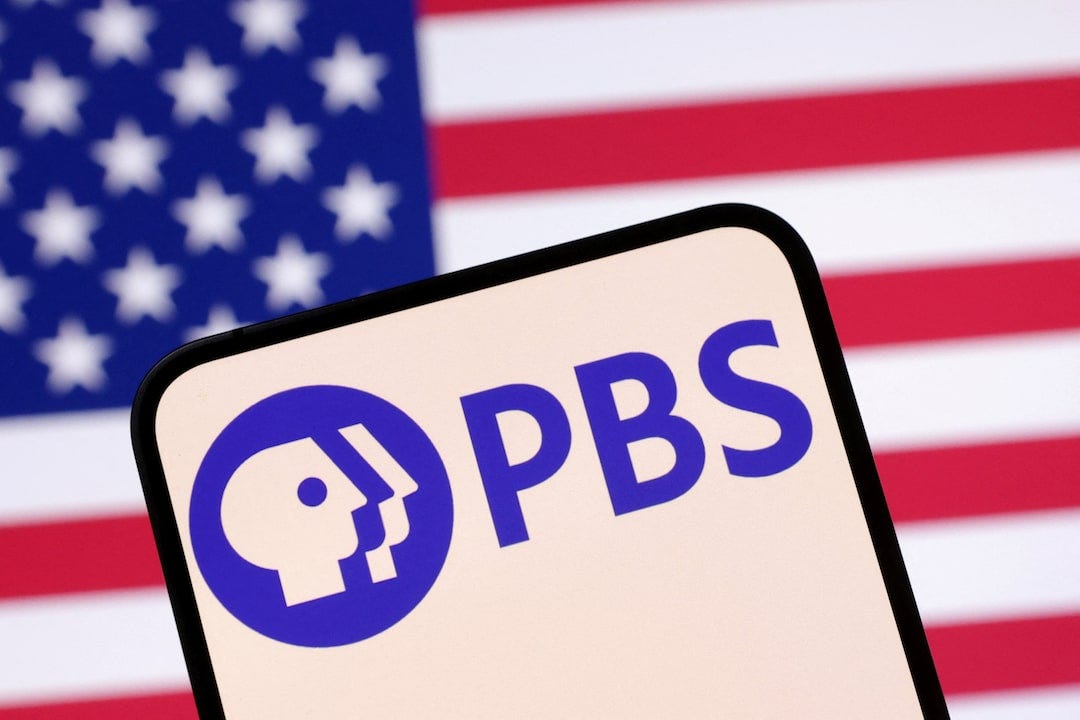Essay: What Makes a Productive Political Cartoon?
Thoughts on an old art form, shared with humility
Earlier today I saw a political cartoon that showed Trump saying that PBS is “BS.”
I thought this cartoon was a great illustration of something I’ve seen in a lot of cartoons for a long time.
I think cartoonists, satirists, etc. often think of a pun or funny visual image and then go “that’s a good idea!” before bothering to consider if it’s a good argument.
I am not saying that all or most cartoons should seek to be “nice.” Most cartoons should criticize or point out a contrast.
Arguments can be effective without being cruel, ad hominem, or demeaning. Tough love is still kind.
OF COURSE critical cartoons usually can’t be "kind," as in "nice." I'm talking about a deeper sort of kindness. I'm talking about a desire to acknowledge the argument of the opposition, and then counter it, out of a desire not to just be right but to add to the conversation in a substantive way.
Unfortunately, I think I do need to talk about the specific cartoon I saw this morning that served as an example of the issues I'm talking about in order to make clear what I'm talking about.
To call an entire network of children's programming "BS"--how is that helping anyone? Sure, there's a pun there, but who is that cartoon going to persuade to come around to the cartoonist's view?
A cartoon like that will embolden the cartoonist's existing audience with shared beliefs, but with what? Emotion and the idea that your opponents are "BS"-peddlers?
How is that going to make you more educated for your dinner-table conversation? How is that going to make you more thoughtful about the problem at hand?
And I don't think readers, leaders, or organizations respond cooperatively to being called "BS."
I believe too many cartoons make these kinds of sweeping statements for the sake of simplicity, visual or conceptual.
These cartoons abuse the ability of a work in this medium to sum up a thousand words.
Consider this part of me being a new voice in the field, or a woman who believes in being too nice, or whatever. I think too many cartoons fall into the category of being too critical to convince their subjects to change, or being too simple to capture the real nuance behind an issue.
I hope it goes without saying that I don't think that my own work goes about communicating messages in a maximally effective way. I have been alive for a fraction of the time that some cartoonists have been doing this.
I think political cartooning has the potential to make a significant difference if we think about what is actually going to get the attention of people who political cartoons will make think. I don't want to make work that will just let people who agree with me smile, pat themselves on the back for being right, and go about their day, while simply telling the other side they're stupid.
Hopefully there is space in this line of work for someone with these views about the art form.





Political cartoons can make a major impact. Homer Davenport (1867-1912) got Boss Tweed all riled up. One of Uncle Homer’s most famous cartoons is “No Honest Man Need Fear Cartoons”, which he penned after a bill was introduced to ban them. Homer isn’t my uncle, but I went to HS with someone who can legitimately call him uncle. He is our hometown boy. The Country Boy (his autobiography) is honored in Silverton, Oregon the first weekend in August. We have a parade and Davenport races. And a cartoon contest. Homer imported some of the first Arabian horses to America. My horse, King of the Wind, was 3/4 Davenport Arabian, 1/4 Thoroughbred.